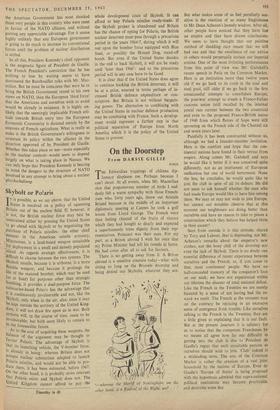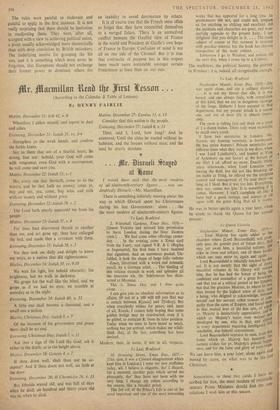On the Doorstep
From DARSIE GILLIE
PARIS
THE Edwardian trappings of château lomacy displease me. Perhaps because I can't shoot. At all events, when Mr. Macmillan shot that preposterous number of birds I sud- denly felt a warm sympathy with those French- men who, forty years ago, threw out Aristide Briand because in the middle of an important diplomatic meeting at Cannes he took a golf lesson from Lloyd George. The French were then feeling cheated of the fruits of victory which they had bought so dearly and expected a superhumanly triste dignity from their rep- resentatives. Poincare was their man. For my part, as a Briton abroad I wish for once that my Prime Minister had left his tweeds at home. He had come after all to ask for favours.
There is no getting away from it. A Briton abroad is a sensitive creature today—what with sitting so long on the Brussels doorstep and being denied our Skybolts, whatever they are.
'—whereas the Sherig .of Nottingham, on the other hand, is a Radical of the 'Right, see? . But what makes some of us feel peculiarly sen- sitive is the reaction of so many Englishmen to Mr. Dean Acheson's homely wisdom. After all, other people have noticed that they have lost an empire and they have drawn conclusions. We seem to have thought that our painless method of shedding ours meant that we still had one and that the excellence of our advice to others would perpetually sustain our imperial ermine. One of the most irritating performances from this point of view was Mr. Gaitskell's recent speech in Paris on the Common Market. Here is an institution more than twelve years old if we go back to its roots in the coal and steel pool, still older if we go back to the first unsuccessful attempts to consolidate Europe, the post-war attempt to create a Franco-Italian customs union (still recalled by the internal postal rate current between the two countries) and even to the proposed Franco-British union of 1940 from which flames of hope were still sprouting on the French side of the Channel six and seven years later.
Painfully it has been constructed without us, although we had a founder-member invitation. Here is the comfort and hope that the con- tinental nations have found in their retreat from empire. Along comes Mr. Gaitskell and says he would like it better if it was conceived quite differently, not as an instrument of European unification but one of world betterment. None the less, he concludes, he would quite like to join the club in spite of all its defects. He did not seem to ask himself whether the men who had made Europe would like to have him among them. We may or may not wish to join Europe, but cannot our notables observe that at this moment our neighbours are doing better than ourselves and have no reason to take to pieces a construction which they believe has helped them in their ascent?
Seen from outside it is this attitude, shared by Tory and Labour, that is depressing, not Mr. Acheson's remarks about the emperor's new clothes, nor the bony chill of the doorstep nor even the lack of Skybolt. There is no doubt one essential difference of recent experience between ourselves and the French, or, if you come to that, most continental people. We have no half-concealed memory of the conqueror's foot on our neck; we have not experienced within our lifetime the disaster of total national defeat. Like the French in the Twenties we are merely haunted by a sense of not having had the re- ward we merit. The French at the moment may on the contrary be rejoicing in an excessive sense of emergence from trouble. Like ourselves talking to the French in the Twenties, they are a little given to explaining that it is our fault. But at the present juncture it is salutary for us to notice that the competent Frenchmen by no means all agree how far our difficulty in getting into the club is due to President de Gaulle's regret that such unsuitable persons as ourselves should wish to join. 'Club' indeed is a misleading term. The aim of the Common Market is rather the creation of a vast joint household by the nations of Europe. Even de Gaulle's 'Europe of States' is being proposed with the hypothesis admitted that supra-national political institutions may become practicable and desirable some day. The rules were painful to elaborate and painful to apply in the first instance. It is not really surprising that there should be hesitation in readjusting them. They were, after all, accepted with a view to achieving political union, a point usually acknowledged more theoretically than with deep conviction by British onlookers. The underlying motive for grouping the Six was, and it is something which must never be forgotten, that Europeans should not exchange their former power to dominate others for
an inability to avoid domination by others.
It is of course true that the French seem often to forget that they have committed themselves to a merged future. There is an unresolved conflict between the Gaullist view of France in the world and President de Gaulle's own hope of France in Europe. Confusion of mind is not all on one side of the Channel. But it is true that continuity of purpose has in this respect been much more noticeable amongst certain Frenchmen at least than on our side.





























 Previous page
Previous page